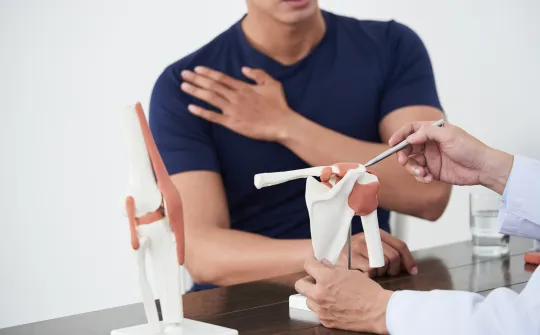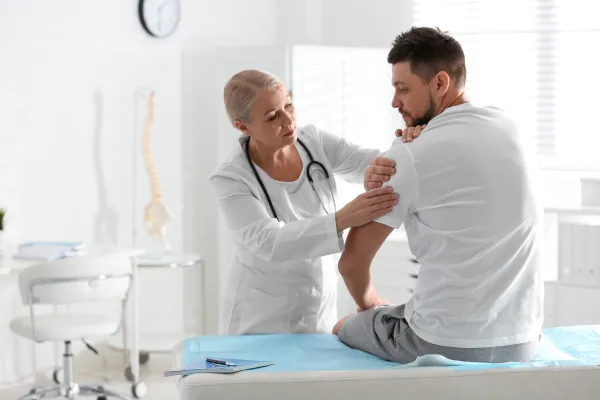
Shoulder
If you struggle with shoulder pain, stiffness or swelling due to arthritis or another shoulder joint disorder, it severely compromises your ability to complete even the simplest everyday tasks.
That's why Orthopaedic Associates of Maine offers a team of board-certified orthopedists who specialize in both surgical and non-surgical shoulder treatments, to get you back to doing what you love. Our shoulder surgeons and physicians provide a level of experience that no other orthopedic practice in Maine can match - and it's reflected in our patients' excellent outcomes. And with offices in Brunswick, Norway, Portland, and Windham, our shoulder specialists provide care that's near you.
Shoulder Resources
The shoulder conditions we treat
- Arthritis
- Fractures
- Labral tear/SLAP tear
- Joint disorders, including Ehlers-Danlos
- Sprains and strains
- Rotator cuff tears

The Shoulder Services Orthopaedic Associates of Maine Provides
- Advanced imaging including MRI and arthrography (a special x-ray to examine the interior of a joint)
- Non-surgical treatments including pain management (anti-inflammatory medications, cortisone injections) and physical and occupational therapy
- Minimally invasive arthroscopic surgery, usually performed in an ambulatory setting
- Design and fabrication of custom splints or braces to protect and/or rehabilitate an injured area
- Total joint replacement for degenerative or arthritic problems

Types of shoulder joint replacement
Total shoulder replacement
Reverse total shoulder replacement
What is shoulder arthroscopy?
Shoulder arthroscopy is a minimally invasive surgery that orthopedic surgeons use to diagnose and treat shoulder problems. During shoulder arthroscopy, your surgeon inserts a small camera, called an arthroscope, into your shoulder joint. The camera displays pictures on a video monitor, and your surgeon uses these images to guide surgical instruments. Shoulder arthroscopy may be used for rotator cuff repair, surgery for impingement syndrome, or surgery for shoulder instability.
When do you need a shoulder joint replacement?
Before we recommend shoulder joint replacement surgery, we typically suggest non-surgical measures to alleviate your pain and stiffness, and preserve your natural joint. These conservative treatments may include:
- Over-the-counter non-steroidal anti-inflammatory medications (NSAIDS) such as ibuprofen, naproxen and acetaminophen
- Avoiding or modifying activities that cause pain
- Physical therapy and low-impact exercise
- Weight loss to take pressure off damaged joints
- Bracing to provide support
- Corticosteroid injections
If these conservative measures don't provide sufficient relief, joint replacement may be the best solution for eliminating your pain and restoring mobility. But this decision is made only after a thorough health evaluation and discussion between you and our orthopedic specialists.
Know what to expect from shoulder joint replacement surgery
Studies show that informed patients have better outcomes. There are a number of ways to being informed about your shoulder joint replacement procedure. Our hospital partners offer free joint classes and connect you with a nurse navigator to make sure you have all the information you need for your hospital procedure. If you are scheduled to have your joint replacement as an overnight patient in the hospital you will be provided the pre-surgical class schedule.
An innovative approach to pain management
Research shows that this approach improves pain relief while reducing opioid requirements and their related adverse effects—including the risk of addiction. Importantly, it enables our patients to be up and moving—without significant pain—within hours of surgery, putting them on a fast path to recovery.
Physical rehabilitation: The key to your recovery
You'll begin your physical rehabilitation before your planned procedure and then within hours of waking up from surgery, starting with gentle exercises to help you bear weight and move your new joint. Your Orthopaedic Associates of Maine team will refer you to meet with your therapist before surgery and then you will schedule appointments to be ready for rehabilitation right after discharge.





